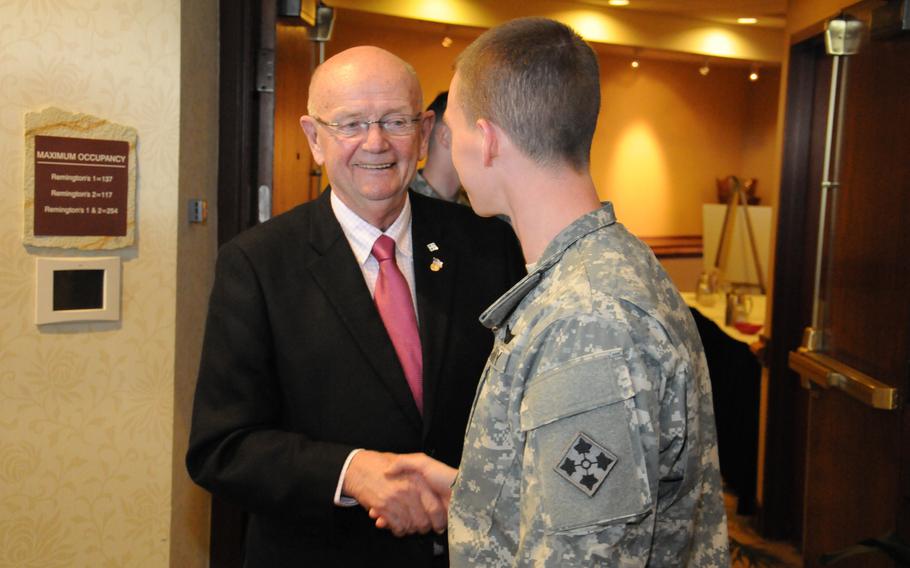
Retired Army Gen. Gordon R. Sullivan, a former service secretary and chief of staff, greets a solider in 2013. Sullivan died Tuesday, Jan. 2, 2024. (Eric Glassey/U.S. Army)
Retired Army Gen. Gordon R. Sullivan, the service’s 32nd chief of staff, who oversaw a transformational Army after Operation Desert Storm, died Tuesday, the Association of the U.S. Army announced. He was 86.
A career armor officer, Sullivan spent 36 years in the Army serving two tours to Vietnam before rising in the ranks to lead the service as its top officer from 1991 to 1995, according to his service records. For three months in 1993, Sullivan served as Army chief of staff and acting Army secretary. He was appointed to the role by former President Bill Clinton after the previous secretary’s sudden dismissal from the job for theft. Sullivan is the only person to ever serve in both top Army positions simultaneously.
Retired Army Gen. Bob Brown, the president and CEO of AUSA, called Sullivan “a true American hero and an Army legend.”
“He was an inspirational leader of integrity and compassion who served his beloved Army and country selflessly for decades,” Brown said in a statement announcing Sullivan’s death. “As the 32nd chief of staff of the Army, he led the service through critical times with strength and a clear vision, ensuring soldiers and their families had the best training and resources.”
In addition to his decades in uniform, Brown credited Sullivan with a continued commitment to service as a civilian. Sullivan served more than 18 years as president and CEO of AUSA, and he was a member of multiple boards, including the Army Historical Foundation and Norwich University in Vermont, his alma mater.
“He was an amazing person, and we will all deeply miss his wit, leadership and wisdom,” Brown said.
The Army’s Sullivan Cup, the biennial service-wide competition to crown the Army’s best tank crew held at Fort Moore, Ga., is named for the late general.
Sullivan was a Boston native who grew up in nearby Quincy, Mass. He was commissioned into the Army in 1959 after graduating from Norwich and was sent to Vietnam for the first time in 1962.
During his career, he commanded at almost every level in the Army, including the 3rd Armored Division’s 1st Brigade and the 1st Infantry Division, according to his service records. He also served as the Army’s operations and plans chief and its vice chief of staff before becoming the service’s chief of staff.
As the Army’s top general, he oversaw a drawdown of some 600,000 soldiers after the end of Desert Storm. Meanwhile, he worked to modernize the Army with efforts to bring new technology to the battlefield, often to improve awareness and firepower at the service’s lowest levels.
“I believe the essential nature of the Army has remained constant since the beginning,” Sullivan said in 2016 interview with AUSA. “It is the soldier. The soldier is the weapon. He or she is the answer. They are the ones who adapt on the battlefield. Ultimately, success will rest on the shoulders of the men and women who had the courage to serve. I believe that.”
His tenure as chief of staff was also marked with a series of unanticipated contingencies to which he deployed soldiers, including Somalia, Rwanda, Haiti and the Balkans.
The Army’s experiences in Somalia’s capital Mogadishu – where 18 U.S. soldiers were killed and dozens more injured in the 15-hour October 1993 battle now commonly known as “Black Hawk Down” – were especially scarring for Sullivan. He said in a 2002 Army oral history interview that he continued to “think about Mogadishu a lot.”
“I ask myself if I could have done anything to prevent the events of 3 to 4 October 1993,” he said in that interview. “I expect I will continue to do so for the rest of my life.”
In 2021, Sullivan’s hometown Quincy unveiled a 7-foot bronze statue of the former general during a ceremony to dedicate the new Generals Bridge and Park to him and two other four-star generals from the town.
In a speech at the dedication, Sullivan told the crowd that he was inspired by the men and women who serve in the military.
“If you stick your hand up in the air at some recruiting station and say, ‘Send me, send me,’ you are my hero,” Sullivan said in his remarks. “There’s nothing like being in a uniform and serving the United States of America. I have told many people, if I could do it again, I would. And I am not kidding.”